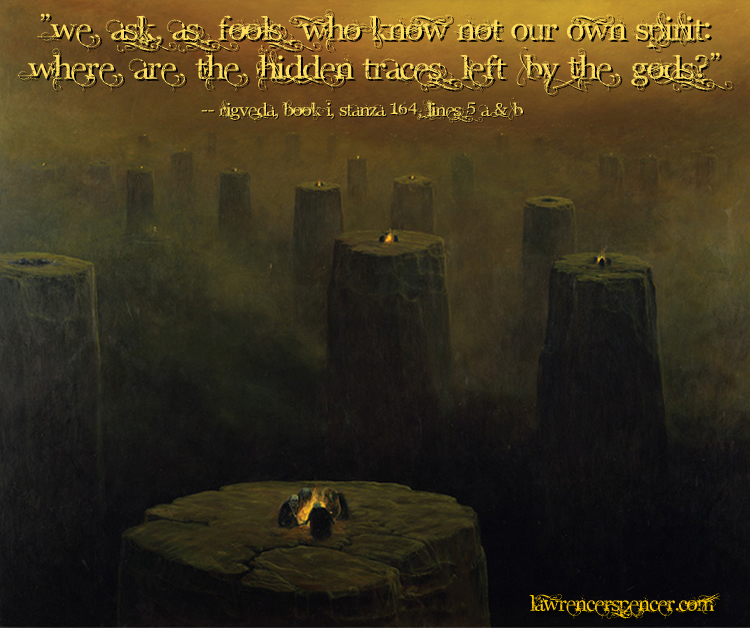Republished by Blog Post Promoter
Tag Archives: Rigveda
HYMN OF CREATION
Republished by Blog Post Promoter
 The Nasadiya Sukta is known as the Hymn of Creation. It is the 129th hymn of the 10th Mandala of the Rigveda. This is an original Sanskrit text, translated into English by A. L. Basham (1914 – 1986):
The Nasadiya Sukta is known as the Hymn of Creation. It is the 129th hymn of the 10th Mandala of the Rigveda. This is an original Sanskrit text, translated into English by A. L. Basham (1914 – 1986):
“नासदासीन्नो सदासीत्तदानीं नासीद्रजो नो व्योमा परो यत् ।
किमावरीवः कुह कस्य शर्मन्नम्भः किमासीद्गहनं गभीरम् ॥ १॥
Then even nothingness was not, nor existence,
There was no air then, nor the heavens beyond it.
What covered it? Where was it? In whose keeping?
Was there then cosmic water, in depths unfathomed?
न मृत्युरासीदमृतं न तर्हि न रात्र्या अह्न आसीत्प्रकेतः ।
आनीदवातं स्वधया तदेकं तस्माद्धान्यन्न परः किञ्चनास ॥२॥
Then there was neither death nor immortality
nor was there then the torch of night and day.
The One breathed windlessly and self-sustaining.
There was that One then, and there was no other.
तम आसीत्तमसा गूहळमग्रे प्रकेतं सलिलं सर्वाऽइदम् ।
तुच्छ्येनाभ्वपिहितं यदासीत्तपसस्तन्महिनाजायतैकम् ॥३॥
At first there was only darkness wrapped in darkness.
All this was only unillumined water.
That One which came to be, enclosed in nothing,
arose at last, born of the power of heat.
कामस्तदग्रे समवर्तताधि मनसो रेतः प्रथमं यदासीत् ।
सतो बन्धुमसति निरविन्दन्हृदि प्रतीष्या कवयो मनीषा ॥४॥
In the beginning desire descended on it –
that was the primal seed, born of the mind.
The sages who have searched their hearts with wisdom
know that which is kin to that which is not.
तिरश्चीनो विततो रश्मिरेषामधः स्विदासीदुपरि स्विदासीत् ।
रेतोधा आसन्महिमान आसन्त्स्वधा अवस्तात्प्रयतिः परस्तात् ॥५॥
And they have stretched their cord across the void,
and know what was above, and what below.
Seminal powers made fertile mighty forces.
Below was strength, and over it was impulse.
को अद्धा वेद क इह प्र वोचत्कुत आजाता कुत इयं विसृष्टिः ।
अर्वाग्देवा अस्य विसर्जनेनाथा को वेद यत आबभूव ॥६॥
But, after all, who knows, and who can say
Whence it all came, and how creation happened?
the gods themselves are later than creation,
so who knows truly whence it has arisen?
इयं विसृष्टिर्यत आबभूव यदि वा दधे यदि वा न ।
यो अस्याध्यक्षः परमे व्योमन्त्सो अङ्ग वेद यदि वा न वेद ॥७॥
Whence all creation had its origin,
he, whether he fashioned it or whether he did not,
he, who surveys it all from highest heaven,
he knows – or maybe even he does not know.“

